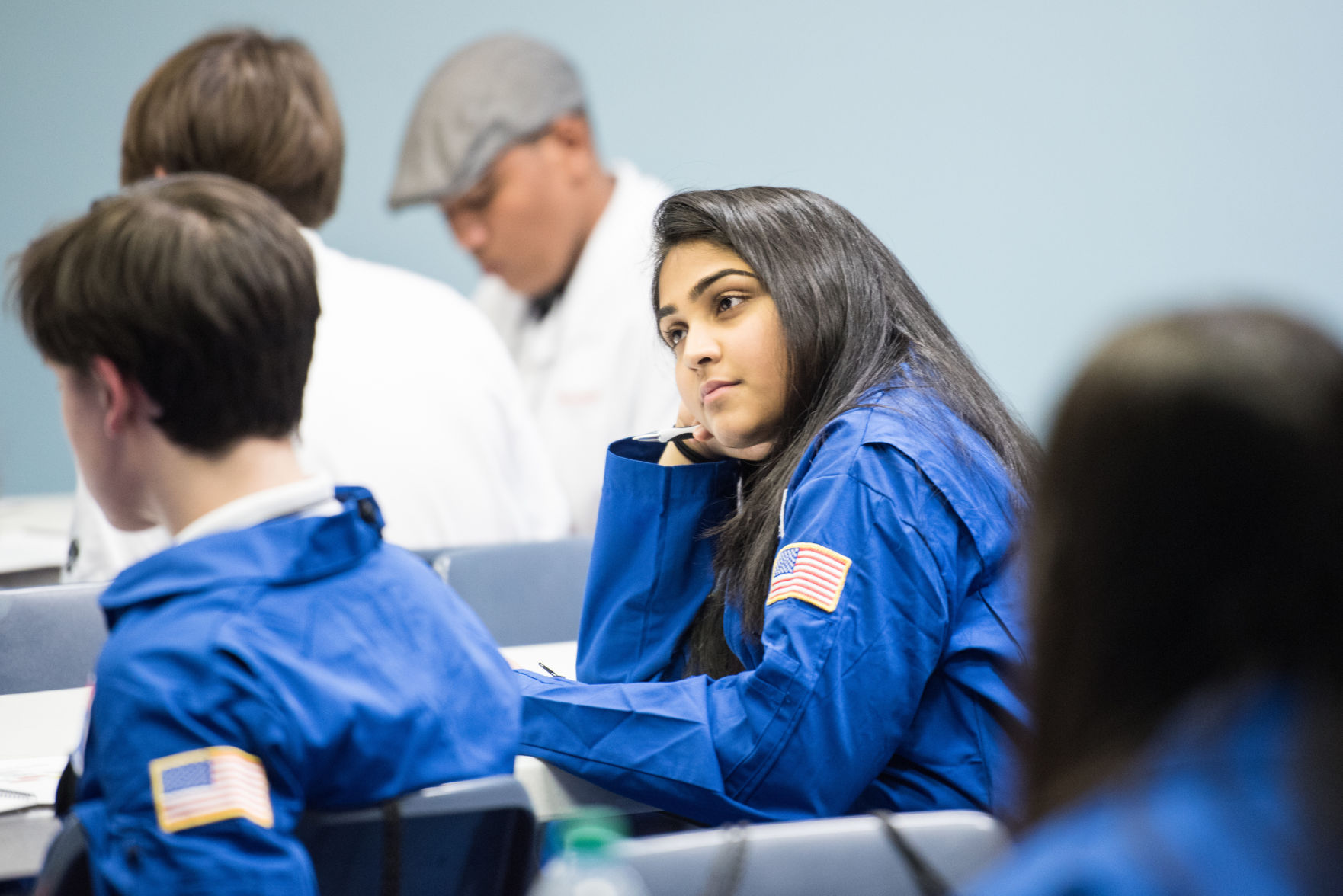By Andrew Martins, Managing Editor
Making her way to the stars may not be the ultimate goal for Rhea Dutta, but for one week, she recently joined 160 students from around the world to both experience life as a NASA scientist and train as the astronauts do., As a 17 year-old Hillsborough High School senior, Dutta was selected to participate in the Honeywell Leadership Challenge Academy at the U.S. Space & Rocket Center (USSRC) in Huntsville, Ala., “I’ve always been interested in space and just how we can successfully get into space, so I knew I wanted to apply,” she said., The Honeywell Leadership Challenge Academy is an annual scholarship program that “aims to encourage excitement and engagement around Science, Technology, Engineering and Math (STEM) subjects for students between the ages of 16-18,” according to the program website., This year, 320 students from 45 countries and 27 states partook in the program, which features numerous STEM related activities like building and testing rockets, simulated astronaut training, conducting shuttle missions and a simulated moon walk., “Honeywell Leadership Challenge Academy is designed to inspire students to become tomorrow’s science, math and engineering leaders,” Honeywell Hometown Solutions President Michael A. Bennett said. “We want to give these students a passion to fuel their generation’s technological contributions to the world.”, Since its inception in 2010, nearly 2,100 students of Honeywell employees have participated in Honeywell’s program by Honeywell, which is conducted in conjunction with the USSRC., Dutta said she learned of the opportunity from her father Joydeep, who works as a computer engineer for the company. Since she shares an interest in computer sciences with her father, Rhea said she was excited to learn that she had been selected., “I’ve always been interested in math and science and space is one of those unknown things that I’ve always wanted to explore,” she said. “So when the program came around, it kind of used applications of engineering, leadership and communication and how that all fits in the NASA program.”, Over the course of the week, students were regularly put into “high stress” situations and assessed by their leaders for how they operated under pressure. Eventually, participants were assessed and placed into various positions that reflected real-world jobs in NASA., “I was chosen to be the shuttle commander, so I had to navigate my crew and give out instructions,” Rhea said. “Basically, we had to pretend that we were astronauts on a mission.”, Dutta’s life as an astronaut looks to be short-lived, she said, as she was more interested in the work that goes into a successful space mission behind the scenes., “I did get to meet some of the engineers who work for NASA, so maybe I’d like to potentially work on the rockets and developing systems that astronauts use,” she said. “Being an astronaut may be a little too far out there for me.”, The program also gave Dutta her first real exposure to other cultures, as she met students her age from as far as Russia and Romania during the week., After spending five 13-hour days with students from different cultures, however, Dutta said conversations quickly changed from introductory chats into other normal teenage topics, like life as a high school student and what their home life was like., “We were just trying to see what we knew about the cultures and stereotypes,” Rhea said. “When I said that I was from [New] Jersey, people were like ‘you don’t seem like someone from the shows.’”, As a girl looking to get a career with a focus in STEM, which has predominantly been a male-dominated field, Dutta said gender did not play a role at all during the program., “It wasn’t ‘the guys versus the girls’ at all because we all had the same interests,” she said. “Everyone was there to help each other. We were a team and we were working as one.”, This June, Dutta is expected to graduate from Hillsborough High School. With a plan to pursue a computer engineering degree from either The College of New Jersey, Drexel University or Stevens Institute of Technology, she said she hopes more girls go for a life of science if that’s what they want to do., “If you’re interested in something and you think it’s something you can pursue and do well with, do it,” she said. “There were more guys than girls in the program, but that’s something you learn to deal with and you become closer to everyone there.”

